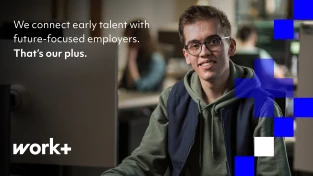
For many of us, we’ll have been taught from a young age about the importance of words. The ability they have to build up or, conversely, hurt and discourage. That picture of a mere spark starting a forest fire – of words having a unique power to impact for good or ill.
Experts have long taught us how language influences our way of thinking and – either subtly or unsubtly – can create barriers and close down what’s possible.
Over the years, I’ve often been struck by our language around employment and how regularly the phrase ‘bright young graduates’ is used alongside major investment announcements.
The phrase ‘bright young graduates’ creates two obvious barriers – that these exciting new opportunities being announced are only for (i) the young and (ii) university educated.
More than ever – and particularly as we emerge from the pandemic – we need to revise some of our habitual ways of speaking.
How different would it be if we replaced ‘bright young graduates’ with ‘ambitious learners’? Gone is the age barrier and the opportunities have broadened significantly.
“a learning mindset – coming into work every day as a learner – is one of the greatest ingredients to success in the working world.”
David Ausdahl, Managing Director of Lowden Guitars
Employers like David don’t just want someone who has proven they can retain and recite knowledge, they want people who have a love for learning that will benefit themselves and the business.
We learn best by doing. This is at the heart of apprenticeships.
Apprentices are on the right path to lifelong learning as it’s built into their mindset from the outset, and their learning approach will make them more flexible and resilient to future flux in the economy.
Over the years, employers have told me how their organisations have ‘woken up’ to this parallel approach of working and learning through apprenticeships. Some of these companies traditionally only employed graduates and are now seeing the benefits of a ‘hybrid’ approach to entry–level talent.
Don’t misunderstand me, I am in no way anti–graduate (if such a word exists!). Businesses need both apprentices and graduates as they bring different benefits and skills sets to organisations.
But as we emerge from the pandemic, and accelerate into a more digitally–enabled economy, the core and essential skills that are developed by apprentices from the outset (empathy, team–working, communication) will give them a huge advantage over their graduate counterparts.
So, in this, Northern Ireland Apprenticeship Week, I’d encourage us to rethink our language around employment and talent. Let’s use language that is not age–bound and restrictive, but is empowering, and offers hope to a broad range of enthusiastic, talented people of all ages and academic backgrounds.
To join our network of employers that are changing how our culture views apprenticeships, register for our webinar on Thursday 29 April at 12:30
webinar















